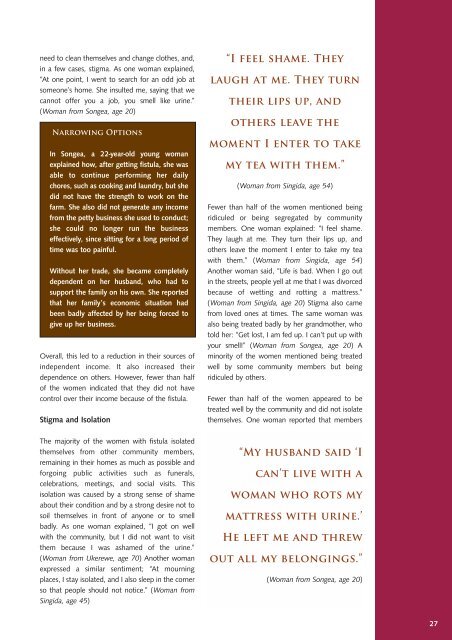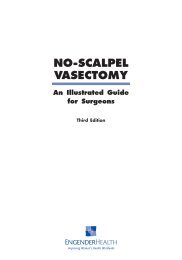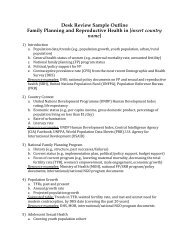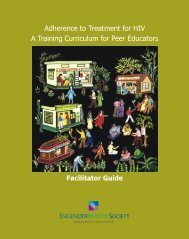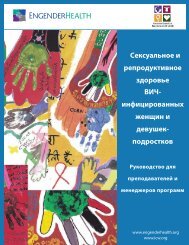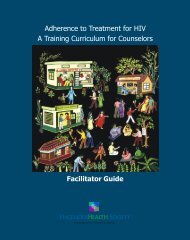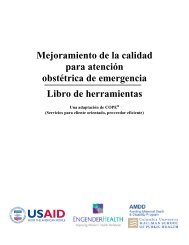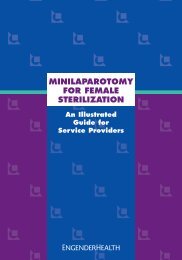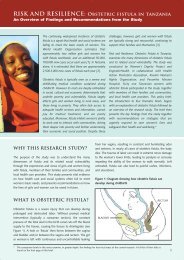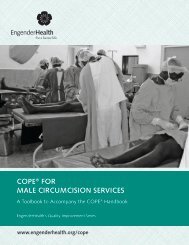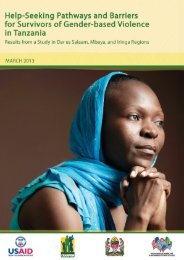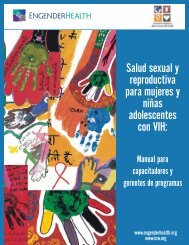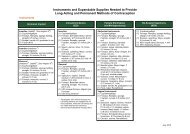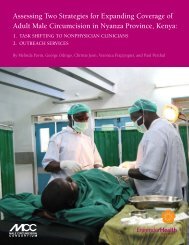Risk and Resilience: Obstetric Fistula in Tanzania - EngenderHealth
Risk and Resilience: Obstetric Fistula in Tanzania - EngenderHealth
Risk and Resilience: Obstetric Fistula in Tanzania - EngenderHealth
Create successful ePaper yourself
Turn your PDF publications into a flip-book with our unique Google optimized e-Paper software.
need to clean themselves <strong>and</strong> change clothes, <strong>and</strong>,<br />
<strong>in</strong> a few cases, stigma. As one woman expla<strong>in</strong>ed,<br />
“At one po<strong>in</strong>t, I went to search for an odd job at<br />
someone’s home. She <strong>in</strong>sulted me, say<strong>in</strong>g that we<br />
cannot offer you a job, you smell like ur<strong>in</strong>e.”<br />
(Woman from Songea, age 20)<br />
Narrow<strong>in</strong>g Options<br />
In Songea, a 22-year-old young woman<br />
expla<strong>in</strong>ed how, after gett<strong>in</strong>g fistula, she was<br />
able to cont<strong>in</strong>ue perform<strong>in</strong>g her daily<br />
chores, such as cook<strong>in</strong>g <strong>and</strong> laundry, but she<br />
did not have the strength to work on the<br />
farm. She also did not generate any <strong>in</strong>come<br />
from the petty bus<strong>in</strong>ess she used to conduct;<br />
she could no longer run the bus<strong>in</strong>ess<br />
effectively, s<strong>in</strong>ce sitt<strong>in</strong>g for a long period of<br />
time was too pa<strong>in</strong>ful.<br />
Without her trade, she became completely<br />
dependent on her husb<strong>and</strong>, who had to<br />
support the family on his own. She reported<br />
that her family’s economic situation had<br />
been badly affected by her be<strong>in</strong>g forced to<br />
give up her bus<strong>in</strong>ess.<br />
Overall, this led to a reduction <strong>in</strong> their sources of<br />
<strong>in</strong>dependent <strong>in</strong>come. It also <strong>in</strong>creased their<br />
dependence on others. However, fewer than half<br />
of the women <strong>in</strong>dicated that they did not have<br />
control over their <strong>in</strong>come because of the fistula.<br />
Stigma <strong>and</strong> Isolation<br />
The majority of the women with fistula isolated<br />
themselves from other community members,<br />
rema<strong>in</strong><strong>in</strong>g <strong>in</strong> their homes as much as possible <strong>and</strong><br />
forgo<strong>in</strong>g public activities such as funerals,<br />
celebrations, meet<strong>in</strong>gs, <strong>and</strong> social visits. This<br />
isolation was caused by a strong sense of shame<br />
about their condition <strong>and</strong> by a strong desire not to<br />
soil themselves <strong>in</strong> front of anyone or to smell<br />
badly. As one woman expla<strong>in</strong>ed, “I got on well<br />
with the community, but I did not want to visit<br />
them because I was ashamed of the ur<strong>in</strong>e.”<br />
(Woman from Ukerewe, age 70) Another woman<br />
expressed a similar sentiment; “At mourn<strong>in</strong>g<br />
places, I stay isolated, <strong>and</strong> I also sleep <strong>in</strong> the corner<br />
so that people should not notice.” (Woman from<br />
S<strong>in</strong>gida, age 45)<br />
“I feel shame. They<br />
laugh at me. They turn<br />
their lips up, <strong>and</strong><br />
others leave the<br />
moment I enter to take<br />
my tea with them.”<br />
(Woman from S<strong>in</strong>gida, age 54)<br />
Fewer than half of the women mentioned be<strong>in</strong>g<br />
ridiculed or be<strong>in</strong>g segregated by community<br />
members. One woman expla<strong>in</strong>ed: “I feel shame.<br />
They laugh at me. They turn their lips up, <strong>and</strong><br />
others leave the moment I enter to take my tea<br />
with them.” (Woman from S<strong>in</strong>gida, age 54)<br />
Another woman said, “Life is bad. When I go out<br />
<strong>in</strong> the streets, people yell at me that I was divorced<br />
because of wett<strong>in</strong>g <strong>and</strong> rott<strong>in</strong>g a mattress.”<br />
(Woman from S<strong>in</strong>gida, age 20) Stigma also came<br />
from loved ones at times. The same woman was<br />
also be<strong>in</strong>g treated badly by her gr<strong>and</strong>mother, who<br />
told her: “Get lost, I am fed up. I can’t put up with<br />
your smell!” (Woman from Songea, age 20) A<br />
m<strong>in</strong>ority of the women mentioned be<strong>in</strong>g treated<br />
well by some community members but be<strong>in</strong>g<br />
ridiculed by others.<br />
Fewer than half of the women appeared to be<br />
treated well by the community <strong>and</strong> did not isolate<br />
themselves. One woman reported that members<br />
“My husb<strong>and</strong> said ‘I<br />
can’t live with a<br />
woman who rots my<br />
mattress with ur<strong>in</strong>e.’<br />
He left me <strong>and</strong> threw<br />
out all my belong<strong>in</strong>gs.”<br />
(Woman from Songea, age 20)<br />
27


